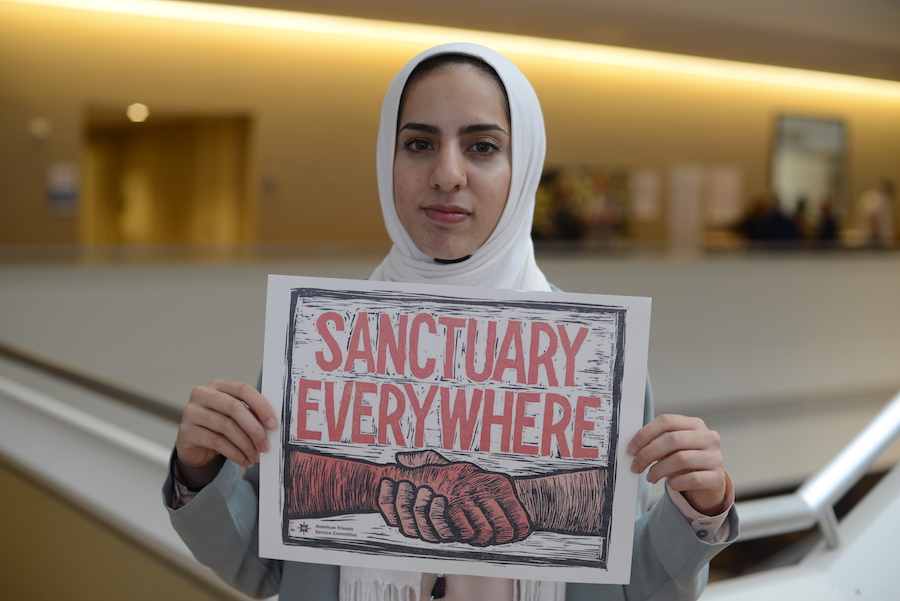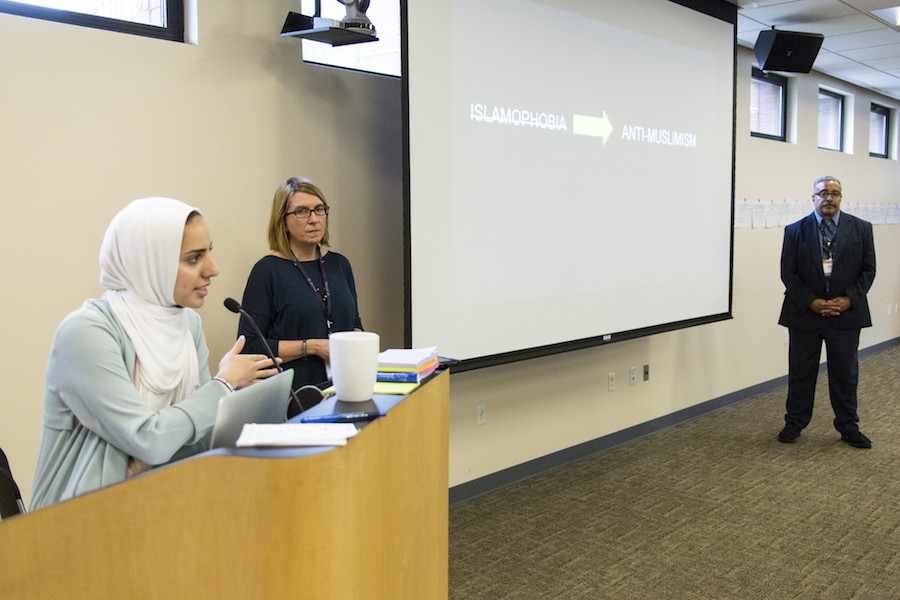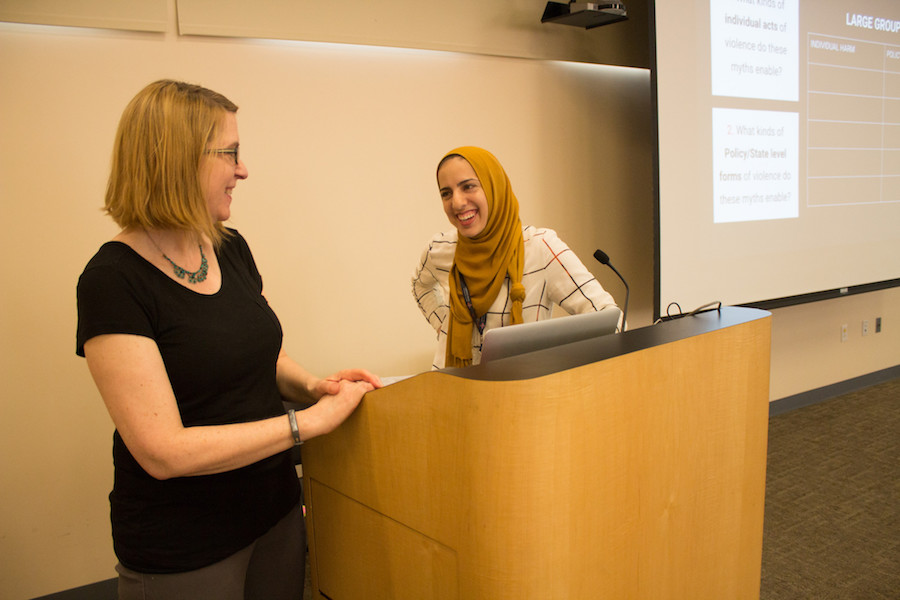
Dina El-Rifai is the public policy fellow in AFSC's Office of Public Policy and Advocacy in Washington, D.C. Dina helps develop and co-facilitate anti-Islamophobia trainings for allies with an intersectional, institutional, and racial framework. She also works with the Communities Against Islamophobia program to monitor federal legislation and writes media pieces with analysis and an alternative narrative that centers the impacted community and criticizes institutional and structural anti-Muslimism. The following interview is lightly edited from email correspondence.
Emily McGrew (EM): What inspires your work?
Dina El-Rifai (DE-R): I came to this AFSC fellowship after having lived in Nashville, Tennessee for 12 years. Because Tennessee served as a testing ground for a lot of racist, xenophobic, anti-Muslim legislation, the environment I grew up in throughout my middle school, high school, and college years was largely impacted by the sorts of policies that would surface [nationally]. In 2010 and 2011, we saw a lot of mosque opposition and anti-shariah bills surface in Tennessee.
I remember feeling a lot of fear and frustration as I was exposed to this level of anti-Muslim hatred and intolerance, and try to reconcile how an identity and country that I claim could inflict such violence onto me.
Being exposed to this at a young age, as well as being an Egyptian-American who around the same time—in 2011 when the Arab Spring and the Egyptian revolution started—was seeing my people rise up against oppressive and dictatorial regimes, take to the streets with their demands, and push for social justice, my passion for social justice continued to grow.
During the summer of 2013, I was in Egypt and witnessed the world around me bleeding as one of the world’s largest killings of demonstrators in a single day in recent history occurred, known as the Rab’aa Massacre. Close to 1,000 protesters were killed in a single day, and over 2,000 were killed in total. In summer of 2014, in America, we witnessed the Black Lives Matter movement spark in Ferguson. I joined protests in Ferguson in October of 2014, and days later, my uncle in Egypt was targeted and imprisoned as a political prisoner because of unjust and repressive Egyptian tactics that seek to essentially stifle opposition to the government by criminalizing practicing Muslims.
From early in my life, because of my multifaceted identity and the way I experience and empathize with the world around me, I committed myself to resistance. This commitment is what motivated me to choose to look for opportunities to organize for social justice after graduating with a bachelor's in social work, and what ultimately led me to AFSC, whose values and rich revolutionary history resonated with me and inspired me.
 EM: How does your faith influence your work?
EM: How does your faith influence your work?
DE-R: I think this question can best be answered by one of my favorite verses from the Quran which says “those who tread the earth gently, when approached with ignorance, respond only in peace” (25:63). That reflects how I live my life and what motivates my work. My faith teaches me that responding in peace does not mean passivity, but striving for justice. Despite the experiences that I’ve had as a Muslim American and the ignorance I’ve faced, I’m a strong believer in responding to ignorance with peace and fully acknowledge that peace cannot be separated from justice.
There is much that my faith teaches me about standing for justice. Another favorite verse is “O you who have believed, be persistently standing firm in justice, witnesses for God, even if it be against yourselves or parents and relatives. Whether one is rich or poor, God is more worthy of both. So follow not personal inclination, lest you not be just ...” (4:135).
EM: How do you feel about the state of the world now? What is your vision for the world 15 years in the future?
DE-R: To be honest, the state of the world right now can really easily make one feel pretty helpless. From the 1,600 Palestinian political prisoners on hunger strike [note: this hunger striking prisoners won concessions and suspended their strike after our interview, on May 27. You can read more about it here.], to the calculated assaults on my Muslim community (here and abroad)—through weapons arms deals that perpetuate murderous war on terror policies; to our government’s incessant insistence on defending its discriminatory and racist Muslim ban (which was just struck down, again, by a federal appeals court, but is likely to be taken to the Supreme Court by the Trump administration); to the deliberate and disturbing targeting of undocumented immigrants trying to make lives for themselves and their families; to a justice system that in itself is a human rights violation in every way, including its neglect of serving justice for victims of sexual assault; to a society that doesn’t frame American deaths at the hands of domestic violence as honor killings … as you can see, I’m overwhelmed.
My vision for the world in 15 years ... is to live in a world where criticizing your government isn’t met with questioning your loyalty, that instead we amplify these voices; to live in a world where white people in particular can take ownership of the transformative power of accountability and responsibility in a world that continues to be harmed by white supremacy; and to live in a world where we see the concept of shared security lived out in movements and policies; ... to live in a world where we all protect one another, and are working towards a shared goal of global security, in which one people’s security doesn’t impede on or violate another person’s security, humanity, or dignity.

EM: Where do you find hope and inspiration right now?
DE-R: People are waking up, and the people who have been woke (because they’ve long been brutalized by these systems of oppression since before Trump exposed them) are amplifying their voices and are owning their power in leading movements. For me, it’s a laborious task to be living as a Muslim right now, especially as a visible Muslim (wearing hijab). The target on your back can feel all-consuming.
What gives me hope is that to honor the labor of being a Muslim woman in a post-9/11, Trump-era America is to uplift and honor a Muslim diaspora of Black and brown activists that draws on a global experience of resistance to white supremacy, militarization, and colonialism. As an American Muslim, I continue to find strength, courage, hope, and wisdom in Black Muslims who continue to lead and resist a system that doubly marginalizes and disenfranchises them.
EM: Is there anything else you’d like people to know about the work you’re doing?
DE-R: It’s been inspiring to be in D.C., our nation’s capital, and to see such strong and courageous leadership and organizing happening by Muslim women activists. What I find the most encouraging and uplifting is to see narrative-change work happening here, as Islamophobia is framed in a structural and institutional framework, understood as a product of broader systems of oppression, such as imperialism, white supremacy, colonialism, and militarism.
As this narrative-change work is happening, as these political education trainings are unfolding and led by Muslim activists embedded in this work, we’ve also realized the importance of holding Muslim-only political education trainings in order to empower and equip the impacted Muslim communities with the knowledge and skills to understand the complexities of the systems that oppress us so that we are able to challenge them together.